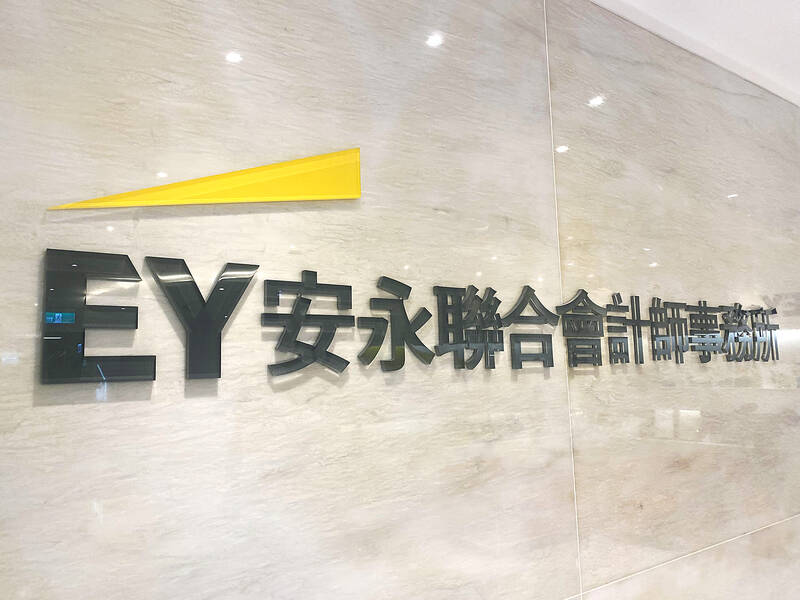Taiwan’s mergers and acquisitions (M&A) market is showing resilience despite global trade tensions triggered by US President Donald Trump’s tariff policy shifts, global accounting firm Ernst & Young’s (EY) local branch said yesterday.
While businesses worldwide are re-evaluating investment strategies, Taiwan is seeing a solid rebound in dealmaking activity, especially in smaller transactions and financial sector integrations, according to EY’s 2025 Global CEO Survey.
The first quarter saw a renewed momentum in mid-sized transactions in Taiwan even as foreign buyers remained cautious due to geopolitical risks, EY said.

Photo: Claire Cheng, Taipei Times
“Despite ongoing global uncertainty, and valuation gaps between buyers and sellers, the current environment presents a rare window of opportunity, especially for well-capitalized buyers with previous deal experience,” said Audry Ho (何淑芬), managing partner at EY’s local transaction advisory service.
While some companies are delaying deals amid tariff uncertainties and geopolitical concerns, others are seizing the moment, the survey showed.
A total of 67 percent of respondents said they plan to pursue joint ventures or strategic alliances, while 57 percent are preparing for acquisitions and 35 percent are exploring divestitures, spin-offs or initial public offerings over the next 12 months, it said.
As Taiwan is navigating the shifting global trade landscape, its dealmakers seem more determined than deterred — ready to act while others hesitate, Ho said.
However, tariff risks demand sharper strategic planning, and companies considering cross-border deals must factor in three core variables, she said.
They are: macroeconomic conditions — to avoid overpaying for targets — and tax and tariff policy directions, which could significantly affect cash flows and integration costs, she said.
In addition, before potential transactions, companies should take into consideration capital market stability, with misaligned price expectations emerging as a key dealbreaker, she added.
The life sciences industry is particularly vulnerable, because heavy reliance on global supply chains makes it susceptible to tariff shocks, the survey said.
European pharmaceutical companies face high US duties, while US firms operating production lines in Europe could be caught in retaliatory crossfire, it said.
Trump’s push for domestic manufacturing and clinical trials while reducing reliance on foreign suppliers also raises cost concerns for companies, it said.
Last year saw a recovery for global and Taiwanese M&A activity after a sluggish 2023, it said.
Total global M&A deals reached US$3.4 trillion last year, up 13.3 percent from the previous year, fueled by looser central bank policies and investor optimism in the booming artificial intelligence sector, it said.
Taiwan posted US$12.8 billion in total M&A transactions last year, driven in part by several high-profile deals in the financial sector, it said.
Small-scale M&A deals rose by about 24 percent year-on-year, contributing to heightened market activity, it said.

UNCERTAINTIES: Exports surged 34.1% and private investment grew 7.03% to outpace expectations in the first half, although US tariffs could stall momentum The Chung-Hua Institution for Economic Research (CIER, 中華經濟研究院) yesterday raised its GDP growth forecast to 3.05 percent this year on a robust first-half performance, but warned that US tariff threats and external uncertainty could stall momentum in the second half of the year. “The first half proved exceptionally strong, allowing room for optimism,” CIER president Lien Hsien-ming (連賢明) said. “But the growth momentum may slow moving forward due to US tariffs.” The tariff threat poses definite downside risks, although the scale of the impact remains unclear given the unpredictability of US President Donald Trump’s policies, Lien said. Despite the headwinds, Taiwan is likely

When Lika Megreladze was a child, life in her native western Georgian region of Guria revolved around tea. Her mother worked for decades as a scientist at the Soviet Union’s Institute of Tea and Subtropical Crops in the village of Anaseuli, Georgia, perfecting cultivation methods for a Georgian tea industry that supplied the bulk of the vast communist state’s brews. “When I was a child, this was only my mum’s workplace. Only later I realized that it was something big,” she said. Now, the institute lies abandoned. Yellowed papers are strewn around its decaying corridors, and a statue of Soviet founder Vladimir Lenin

READY TO BUY: Shortly after Nvidia announced the approval, Chinese firms scrambled to order the H20 GPUs, which the company must send to the US government for approval Nvidia Corp chief executive officer Jensen Huang (黃仁勳) late on Monday said the technology giant has won approval from US President Donald Trump’s administration to sell its advanced H20 graphics processing units (GPUs) used to develop artificial intelligence (AI) to China. The news came in a company blog post late on Monday and Huang also spoke about the coup on China’s state-run China Global Television Network in remarks shown on X. “The US government has assured Nvidia that licenses will be granted, and Nvidia hopes to start deliveries soon,” the post said. “Today, I’m announcing that the US government has approved for us

UNIFYING OPPOSITION: Numerous companies have registered complaints over the potential levies, bringing together rival automakers in voicing their reservations US President Donald Trump is readying plans for industry-specific tariffs to kick in alongside his country-by-country duties in two weeks, ramping up his push to reshape the US’ standing in the global trading system by penalizing purchases from abroad. Administration officials could release details of Trump’s planned 50 percent duty on copper in the days before they are set to take effect on Friday next week, a person familiar with the matter said. That is the same date Trump’s “reciprocal” levies on products from more than 100 nations are slated to begin. Trump on Tuesday said that he is likely to impose tariffs